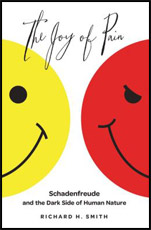Richard H. Smith is Professor of Psychology at the University of Kentucky. He has published articles on various emotions such as envy and shame. His book Envy: Theory and Research was published by Oxford University Press in 2008. In this path-finding work, Smith explores schadenfreude — the pleasure people feel when witnessing or hearing about the misfortunes of others. This human emotion is activated by popular culture, the media, sports, and politics. Two especially sick examples of schadenfreude are revenge fantasies and the television phenomenon of "humilitainment" where viewers enjoy watching the pain and suffering of losers who are treated like dirt. Smith takes a look at two popular shows advancing the cause: American Idol and To Catch a Predator.
What makes schadenfreude thrive? It is built on envy and feelings of superiority. In this fiercely competitive world, there must be winners and there must be losers. We feel superior to the winners and we look down our noses at losers. Behind these feelings lies the prevalence of social comparisons in our daily interactions with others. Schadenfreude does cause harm to those who are scorned or treated shabbily by gossips. In the end, Smith sees it a form of judgment.
